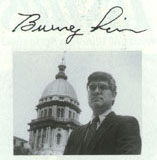STATE OF THE STAFF
Chicago's mayor takes his anti.gun campaign on the road by Burney Simpson Chicago Mayor Richard M. Daley managed to get himself re-elected with 72 percent of the vote last February. These days, of course, that kind of support from local voters doesn't generate much clout beyond the city's limits. But that isn't stopping Daley from taking the campaign against gun violence in his community to the courts, Congress and the legislature. It may be his toughest political battle yet. Chicago already claims to have among the stiffest anti-gun ordinances in the country. They forbid the sale of guns within the city's borders, and restrict private ownership of handguns to those who registered before regulations were enacted in April 1982. All the same, the city's murder rate remains among the highest, too. There were 703 homicides in Chicago in 1998. Of those, 536 were committed with firearms. The numbers are down from previous years, but not as dramatically as in other big cities. In 1997, for example, there were 759 homicides in Chicago, 570 caused by firearms, according to the city's police department. Richard M. Daley is turning to the courts, Congress and the legislature to fight gun violence. But Daley has hit on a broader strategy: He's pushing some of the blame for such dismal statistics onto the gun industry and surrounding suburban communities, arguing Chicagoans are getting guns elsewhere and bringing them back to the city. To make his point, he's filed a $433 million suit in Cook County Circuit Court against 22 gun manufacturers, four distributors and 12 county-based gun shops asking for reimbursement of costs incurred by police and the hospitals that have to respond to gun violence. All but one of the distributors and manufacturers, Faber Brothers Inc. of Chicago, are based out of state. (Cook County also signed on to the suit.) Chicago joins four other cities that have challenged the gun industry in court: Atlanta, Bridgeport, Conn., Miami and New Orleans. St. Louis announced it will file this spring. Three of those communities, Atlanta, Miami and New Orleans, have charged manufacturers with failing to outfit guns with sufficient safety devices. Daley's suit is based on his city's nuisance ordinance. He argues manufacturers, distributors and dealers have created a public nuisance through aggressive sales practices that allow guns to get into the hands of criminals. Further, Daley argues the industry deliberately " saturates" suburban Cook County with weapons because laws regulating guns in some of those communities are more lenient. To bolster his case, Daley points to an undercover investigation of suburban gun shops by Chicago police. Ten officers posing as gang members and soldiers of fortune bought 171 guns during the operation. In conversations with sales staff, the officers said they were Chicago residents and implied they would use the guns for criminal activities. In several instances, police said, clerks sold guns to investigators who didn't have valid state firearms registration cards. Also, Chicago police traced guns used in city homicides to suburban gun shops. Proponents of gun suits take heart from a recent federal court ruling in Brooklyn, N.Y Nevertheless, that jury sent mixed signals. A gunshot victim who survived, along with the relatives of six victims who died, sued 25 gun makers for negligence stemming from distribution and marketing practices. As in the Chicago suit, the plaintiffs argued manufacturers flood areas where gun laws are comparatively lax, knowing they will end up in cities like New York through illegal dealer networks. An expert testifying for the plaintiffs said 90 percent of the handguns used to commit crimes in New York state came from five states with weaker gun laws, including Florida, Georgia, Ohio, North Carolina and Virginia. Then, in a complex decision, the jury found 15 of the gun companies negligent and ordered three to pay teenage survivor Steven Fox $500,000 for injuries he suffered from a gunshot. But they cleared 10 companies. And though the jury ruled negligence led to three of the other killings, no other plaintiff was awarded damages. Both sides declared the ruling a victory,
|
Pages:|1 ||2 | |3 ||4 | |5 ||6 | |7 ||8 | |9 ||10 | Pages:|11 ||12 | |13 ||14 | |15 ||16 | |17 ||18 | |19 ||20 |
Pages:|21 ||22 | |23 ||24 | |25 ||26 | |27 ||28 | |29 ||30 | Pages:|31 ||32 | |33 ||34 | |35 ||36 | |37 ||38 | |39 ||40 | Pages:|41 ||42 | |43 ||44 |
